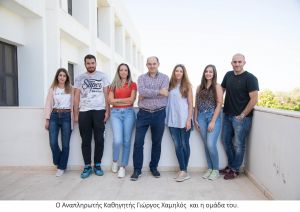All Science News
Prestigious ERC Consolidator Grant awarded to FORTH Researcher Dr. Giorgos Chamilos
Giorgos Chamilos, Researcher at the Institute of Molecular Biology and Biotechnology of the Foundation for Research and Technology – Hellas (FORTH) and Associate Professor at School of Medicine, University of Crete, is awarded a Consolidator Grant from the European Research Council (ERC).
Professor George A. Garinis awarded with the Friedrich Wilhelm Bessel Research Award
George A, Garinis, Professor of Genetics at the department of Biology at the University of Crete and affiliated group leader at the Institute of Molecular Biology and Biotechnology (IMBB) of the Foundation of Research and Technology Hellas (FORTH), is the recipient of the prestigious Friedrich Wilhelm Bessel International Research Award of the Alexander von Humboldt Foundation. The official award ceremony will take place in Bamberg, Germany in March 2020.
Professor Nektarios Tavernarakis newly elected Member of the German National Academy of Sciences Leopoldina
Dr. Nektarios Chrysoulakis earned a highly competitive ERC Synergy Grant
Dr. Nektarios Chrysoulakis, Director of Research at the Institute of Applied and Computational Mathematics of the Foundation for Research and Technology-Hellas (FORTH) earned a highly competitive ERC Synergy Grant 2019.
Dr. Yannis Spyropoulos, Researcher at the IMS, earned a highly competitive ERC Starting Grant.
ERC Starting Grants are awarded to early-career researchers of any nationality with two to sevenyears of experience since completion of the PhD (or equivalent degree) and a scientific track recordshowing great promise. This grant is a funding scheme that supports young talented research leaders to gain independence and build their own research team in Europe.
FORTH Researcher Panagiota Poirazi has been awarded an Einstein Visiting Fellowship to investigate neuronal mechanisms of behavioral flexibility
Dr. Panayiota Poirazi, a Research Director at the Institute of Molecular Biology and Biotechnology of FORTH, is the recipient of a prestigious Einstein Visiting Fellowship of the Einstein Foundation Berlin.
Researchers at IMBB-FORTH challenge the dogma that wants interneurons to be “simple”.
Computational modeling in the Poirazi lab (www.dendrites.gr) at IMBB-FORTH (www.imbb.forth.gr) shed new light on how Fast Spiking Basket Cells – a central subtype of GABAergic inhibitory neurons- integrate their incoming signals, taking advantage of their recently discovered dendritic non-linearities. The article, entitled: “Challenging the point neuron dogma: FS basket cells as 2-stage nonlinear integrators” authored by IMBB researchers Alexandra Tzilivaki, George Kastellakis and Panayiota Poirazi was recently published in the scientific journal Nature Communications.
The second ERC Proof of Concept Grant for the INSPIRE Group, ICS-FORTH
Prof. George A. Garinis, FORTH affiliated researcher, earns an ERC Proof of Concept Grant
FORTH Chairman, Professor Nektarios Tavernarakis is elected Corresponding Member of the Academy of Athens
Nektarios Tavernarakis, Research Director at the Institute of Molecular Biology and Biotechnology (IMBB) of the Foundation of Research and Technology Hellas (FORTH), and Professor at the Medical School of the University of Crete was elected a Corresponding Member of the Academy of Athens.
Page:1 .... 789101112131415 | < Prev Next >











